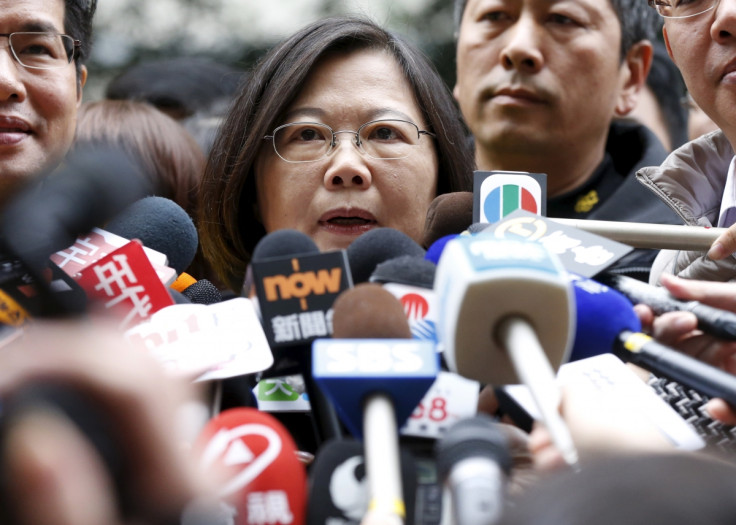Tsai Ing-wen: Who is Taiwan's first female president, leader of the Democratic Progressive Party?

The youngest of 11 children, Tsai Ing-wen breaks the pattern of Asian women in politics. Unlike many before her, she didn't come from a political family, but from a wealthy background – her father made his money servicing imported cars for Americans, buying and selling property, as well as running a hotel and construction company.
The 59-year-old is a latecomer to the political arena, only joining the Democratic Progressive Party (DPP) in 2004. Tsai's early life was in academia. She gained a bachelor of law degree at the National Taiwan University, a masters in law from Cornell University in the US and gained a doctorate at the LSE before becoming a law professor.
According to Taiwan Today, "She is more thoughtful scholar than slogan shouting politico." However, her political awakening took place during her time in New York. In a Time interview, Tsai said she enjoyed living in the Big Apple, for a woman seeking a "revolutionary life".
Her experiences of living in the West opened the new Taiwanese leader's eyes to social as well as political issues. "She is certainly a lot more worldly than previous leaders of the party," says J Michael Cole, a Taipei-based academic who has known Tsai for eight years.
This is borne out by her support for equal marriage. In celebration of the gay pride parade in Taipei, Tsai released a video on Facebook saying: "In the face of love, everyone is equal. Let everyone have the freedom to love and to pursue their happiness. I am Tsai Ing-wen, and I support marriage equality".
She counts Western politicians amongst her influences. Gerrit van der Wees, a Taiwan expert says that she likes to compare herself to the German political leader. "The fact that Angela Merkel opened the borders to the Syrian refugees was something that Tsai commented on as being a very courageous and positive step that she would take too," he said.
An independent identity from China
One of the main reasons for Tsai's success in the presidential elections is a groundswell of feeling amongst Taiwanese to maintain a separate identity from China. It won't have gone unnoticed that Tsai's heritage is from a number of Taiwan's ethnic groups and she is a member of a Taiwanese family that goes back generations. Her father is Hakka, her mother Minnan and her paternal grandmother is from the Paiwan indigenous tribe.
A cautious politician, she has never publicly declared that she favours Taiwan's independence, and in fact has often been criticised for giving few details about her policies. Some have compared her to a vegetable literally named "hollow heart", as it has a hollow stem.
But in her recently published autobiography, The Ing Faction: The Final Mile to Lighting Up Taiwan, she lets slip some clues when she described how she felt when an elderly restaurant worker donated her entire month's salary of NT$20,000 ($600, £418) to her campaign: "I will always remember. She said she doesn't ask for anything in return, and only hopes that the DPP will help her protect Taiwan's sovereignty; she wants to keep being a Taiwanese person."
"She has a very strong sense of Taiwan's rightful place, as she sees it, in the international community, and that rightful place is now being undermined by what Ma Ying-jeou [the former president] has been trying to do over the past few years, pushing Taiwan closer to China," says van der Wees. "So she wants to push that more in the right direction."
There will be tough times ahead as she will need to carry out tricky negotiations with China's Communist leaders. The China Daily paper warned that Tsai should waste no time showing she's sincere about peace and stability with Beijing. Tsai also has to make good her campaign pledges to boost the island's ailing economy by diversifying trade relations, tackling youth unemployment and a growing wealth gap.
Although Tsai claims that her rapid rise in politics was "accidental", her ambition shines out in her autobiography, where she boldly states her aims: "It's an election that I mustn't lose."
Political career
By the early 1990s she was working in government as a key trade negotiator involved in Taiwan's in entry into the World Trade Organisation, and then as a national security adviser to the KMT president Lee Teng-hui. When DPP leader Chen Shui-bian took over from Lee, in 2000, Tsai was given the task of leading the Mainland Affairs Council, which handles relations with China.
Tsai led the DPP to victory in the local elections on 29 November 2014, in which the party secured leadership of 13 of Taiwan's 22 municipalities and counties. The DPP's triumph in the elections strengthened Tsai's position within the party and placed her as the frontrunner in the 2016 presidential elections.
She announced her second bid for the Presidency on 25 February 2015. On 16 January 2016, she clinched the election, winning 56.12% of votes, beating her KMT opponent Eric Chu, who won 31.07% of the votes.
© Copyright IBTimes 2025. All rights reserved.






















